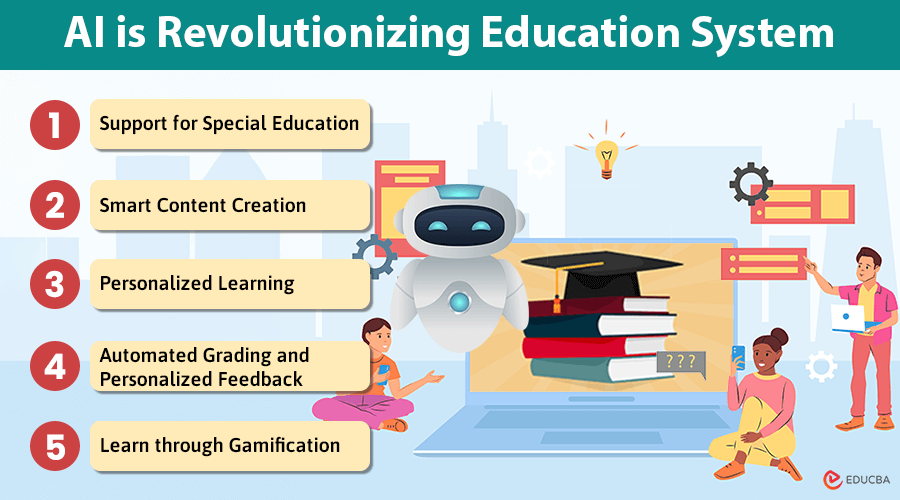Impact of AI on the Education System
Artificial intelligence (AI) is no longer just a futuristic idea; it is now an everyday reality that has made its way into education. According to a Forbes Advisor survey in October 2023, over half of 500 U.S. teachers reported that AI positively changed schools. AI tools, like virtual tutors and classroom management systems, support personalized learning and reduce administrative tasks. These advancements enhance student outcomes and create inclusive, adaptive learning experiences. As AI evolves, its impact on shaping the future of education becomes increasingly significant. To better understand how AI is revolutionizing education and making a difference, let us explore its uses and how it benefits teachers and students today.
5 Smart Ways AI is Revolutionizing Education System
From supporting special education to streamlining administrative tasks, AI is reshaping how students and teachers experience education. Below are five key applications showing how AI is transforming the education system:
#1. Support for Special Education
AI technology is transforming special education by providing personalized support and fostering inclusivity:
- Early Identification: AI helps detect learning disabilities early, enabling timely interventions and tailored teaching strategies.
- Assistive Technologies: Tools like text-to-speech and speech-to-text make learning accessible for students with dyslexia and visual or hearing impairments.
- Inclusive Classrooms: Features like real-time translation and captioning allow all students to participate, regardless of background or abilities.
- Independence and Engagement: AI empowers students to engage with learning materials independently, creating a more welcoming and involved educational environment.
#2. Smart Content Creation
AI is revolutionizing education through smart content creation. Key benefits include:
- Efficient Material Generation: AI helps teachers quickly create quizzes, lesson plans, and summaries based on the subject matter.
- Personalized Learning: Content can be adapted to different learning levels, providing simplified notes for some students and advanced challenges for others.
- Time-Saving and Tailored Resources: Teachers save time while ensuring students receive resources aligned with their learning pace and style.
- Inclusivity: AI-generated materials cater to diverse learning needs, with content accessibility providers ensuring that the resources are inclusive and support all students, regardless of their abilities or learning preferences.
#3. Personalized Learning
AI offers personalized learning experiences, allowing people to learn at their own pace. Traditional methods often fail to account for individual learning differences, but AI addresses this by tailoring lessons to each student’s needs.
- Personalized Learning: AI adapts lessons to each student’s pace and understanding.
- Machine Learning: Tracks student interactions with content and adjusts in real time.
- Customized Tools: AI-powered platforms offer personalized lesson plans and interactive games.
- Individualized Support: Helps students learn without feeling overwhelmed or left behind.
#4. Automated Grading and Personalized Feedback
AI is transforming education by enhancing grading and feedback processes:
- Faster Grading: AI reduces teachers’ time on grading, allowing them to focus more on teaching.
- Personalized Feedback: AI tools offer tailored feedback, helping students identify strengths and areas for improvement.
- Instant Feedback: Students receive timely feedback, enabling quicker learning and boosting confidence.
- Supportive Learning Environment: AI helps students understand their mistakes gently, guiding them toward better problem-solving without discouragement.
- Teacher Workload Reduction: Teachers can rely on AI to manage assessments, providing more time for direct student interaction and improvement.
#5. Learning through Gamification
AI technology is revolutionizing the education system by making learning more engaging through gamification.
- Interactive Learning: AI-powered educational games and simulations make complex topics more accessible and fun, displacing traditional learning methods.
- Motivation Boost: When these games align with the curriculum, they increase student motivation and simplify understanding of new concepts.
- Positive Impact: Studies show that teachers using digital games see positive responses from students.
- Example: Games like Minecraft—Education Edition and Kahoot! Use AI to create immersive, role-playing experiences that bring educational content to life, encouraging students to learn through interactive and relatable scenarios.
Final Thoughts
AI is revolutionizing education system by making learning more personalized, efficient, and accessible. As technology evolves, its effect on teaching and learning will significantly expand. These advancements create new opportunities for students and educators, fostering a more inclusive and engaging educational environment. The future of education is promising, with AI holding an essential position in shaping the direction of learning and teaching.
Author : Emilie Brown
Emilie Brown works with the Content Marketing team at Continual Engine, a leading AI-based accessibility solutions provider that enables organizations to create digitally accessible content compliant with universal accessibility laws. Her approach and methodology are concise, simple, and to the point, and she connects with readers looking for solution-driven content on topics related to accessibility and remediation. Apart from working, she loves spending time with her dog, volunteering, and playing guitar.
Recommended Articles
We hope this article on how AI is revolutionizing education system has helped you with what you seek as a student. Check out our other recommended articles on artificial intelligence and how things work with AI.


